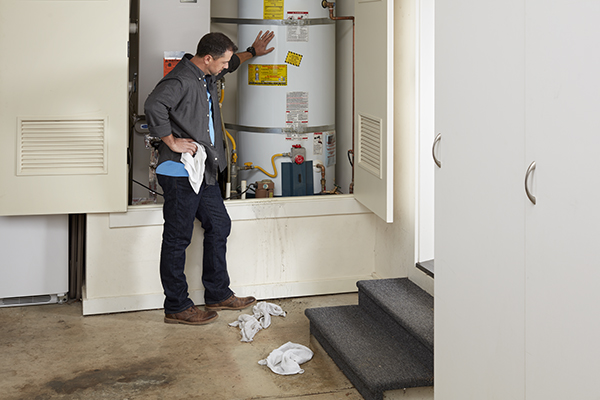Each home appliance has a pre-determined life span. The manufacturers give some estimates but under the condition that the devices are regularly serviced and maintained. For example, the life span of a water heater, besides daily use, is between 10 and 12 years. This period may be shorter if you don’t solve problems with this unit on time.
A boiler malfunction can be as banal as an outdated and worn out installation, but as severe as a heater burnout. In this link, you can check out some of the most common signs that indicate a disrupted water heater function. Failures on these house appliances rarely happen on their own; most of them can be prevented if we know the reason for their occurrence.

Damp and Rust
In most households, heating devices are located in basements, garages, or separate rooms inside the house. People often forget about these parts of their living space, and they rarely do the cleaning and ventilating of these areas. That creates the ideal conditions for corrosion to appear on the heating device and nearby installation, especially if it is already several years old.
In the metal housing of a boiler, there is a tank of a certain capacity, a heating unit, and a simple pipe system. Over time, the metal begins to oxidize due to constant exposure to humidity in the air. This process takes years, creating tiny cracks through which water from the boiler leaks.
This dripping further makes installations and tank decay faster, but can also cause damp, stains and mold occurrence on floors and drywall. If leaking happens nearby power supply, there’s a high chance for more damage in your household.
Unless house owners work on solving the condensation problem, the old appliances will completely rot, so expect to buy a new, not-so-cheap, heating appliance soon. The second option is to change anode rods, which are in charge of preventing rust occurrence.
Sediment Deposition
Water from the water supply system is generally hard because it is rich in minerals and contains a lot of substances that give it quality and make it suitable for household use. When water is heated, a large percentage of dry mass will deposit in the bottoms of tanks and installations.
Purchasing a demand-type water heater can spare you of these troubles, but only somewhat. Tankless devices have positive sides but are not eternal. You cannot stop the sedimentation, whether it occurs in the tank or the pipes. But you can get specific chemicals that ‘soften’ water, and the mineral molecules in it break down, which slows down the deposition process.
In addition to obstructing the flow of water, scale deposits can also build upon the heater and damage it. There is no permanent solution, but regular descaling is a must. You can use commercial non-abrasive cleaners. Or you can make a homemade descaling agent and, following the instructions from this web site, effectively and cheaply remove scale deposits.
Wear-and-Tear
If you notice that the new heater is not heating the water or is only slightly warming it, the fault will be fixed the authorized service, as the appliance probably has a warranty. However, if you notice that your old device is not working, maybe the time for proactive replacement with a newer model has come.
That may be a more expensive start-up investment, but repairing heating devices that have passed the estimated life span is not worth it. There are probably no spare parts on the market, and there is a good chance that it will fail again.
Wrong Estimation of Water Heater Capacity
A mistake that can cause you a lot of problems later, many people make when purchasing a heating appliance. They may buy a device of the wrong size that fails to heat all the water the household need. By working at full capacity for too long, it is clear that no device can last.
The problem with too small heating appliances operating at full speed is the constant high pressure in it. The strong pressure after a while causes the appliance to burst. If this happens, apart from damage to the plumbing system, there is a risk of breakdowns on other installations.
If you do not know what size of the heater you should buy, experts from plumbing services in Whitestown suggest you contact the nearest plumber or dealer. With larger models, you can’t go wrong, but unnecessary heating of water you won’t use, over and over, is a waste of money.
Although it has an essential function in the household, the working principle of water heater operation is quite simple. It means that the defect diagnosis itself is simple. So when a breakdown occurs in the water heater installation, you have to find and fix it quickly, both for safety and need.